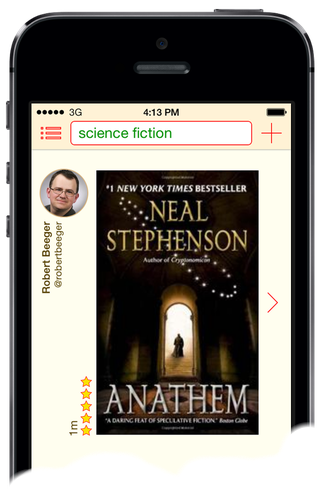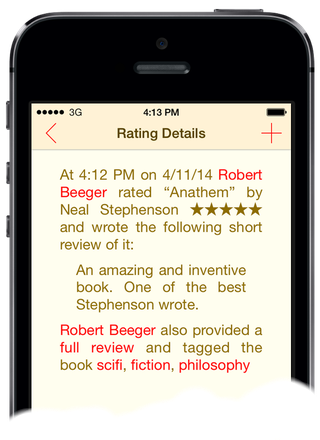As a voracious reader I’m always looking for new books to add to my list of books I might read sometime. This list is never empty. Currently there are over 50 books on it. So there is no real urgency to have new sources filling it, but better to be safe.
One of the sources filling this list is the venerable Locus magazine which provides reviews of science fiction and fantasy books since 1968. Locus is currently the only magazine I’m subscribed to and it’s still delivered by mail and made of paper. I have found some good books through Locus.
But I’m also interested to learn what other people with interests similar to mine are reading. That’s where book centric social networks, on which members rate books, come into play. Actually quite a few of those communities exist, but most don’t offer a native iOS app or don’t even bother to provide a responsive website useable on an iPhone or iPad. One of them has an app, but the core, the book ratings, is hidden behind lots of useless stuff.
Bookitics is my take at a social network for book lovers.
The first thing you see when you open the app are the newest book ratings for your last search.

You can put any search term you’re interested in into the field at the top and have Bookitics search for it at once. Often, like in the image above, you will have searches that you want to execute repeatedly. I’m interested in science fiction. So I have a search called “science fiction” that searches for books with the tag #scifi.
When I used to buy books made of paper, I would go into a book shop and just look through the books on the “science fiction and fantasy” bookshelf. I would pick up books with interesting covers and read the description on their backs, which sometimes also contains praise from other people for the book.
With Bookitics it’s very similar. You have a search, a specialized bookshelf if you will, and you see the book covers at the center. When a cover catches your eye, you notice who rated the book and how highly they rated it. Maybe you know the person who rated the book or maybe you want to know why they think the book is outstanding and worthy of five stars. At this point you tap on the book cover to read the details of the rating.

The book rating details are like the flip side of a book. Here you’ll learn why someone rated a book like they did. It’s where you see their short review of the book and if they provided a link to a longer review, you will be able to go to that longer review. If others have rated the same book, you’ll also see their ratings.
Bookitics uses App.net as its backend. App.net handles your account, including your password, whom you follow and all sorts of other things. They also offer two-factor authentication. So your account is pretty secure. App.net is a solid base and it’s quite fast. With this base the development of Bookitics concentrates on enabling users to rate books without much fuss and to find ratings for interesting books.
If you have a passion for books, give it a try. It’s free as is the App.net account you’ll need to use it. Bookitics is now available on the AppStore for your iPhone or iPod touch and soon for your iPad.

